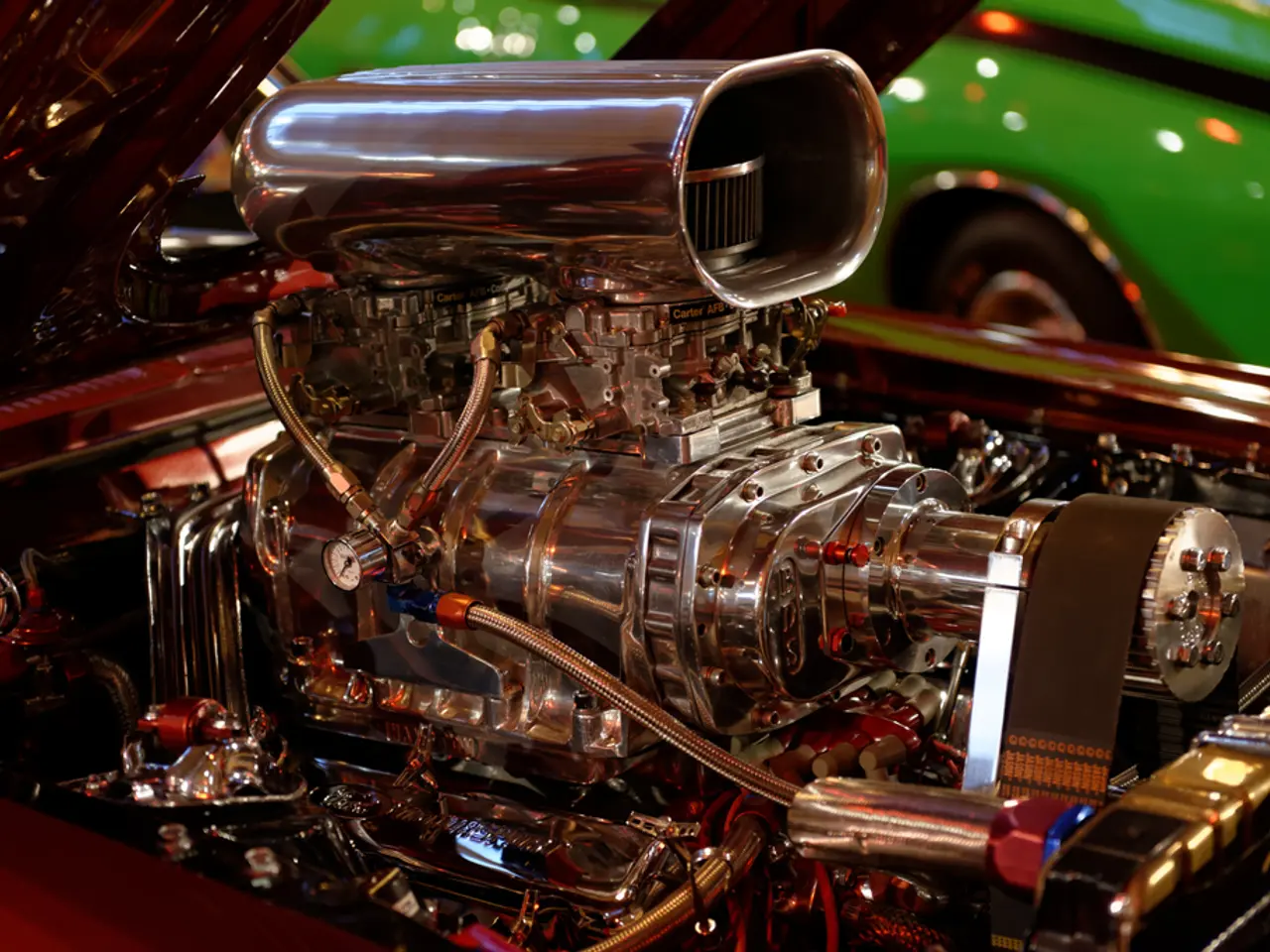Synthetic Fuels Breakdown: Might Artificial Fuels Prolong the Lifespan of Combustion Vehicles?
In the ongoing quest for decarbonization, e-fuels are emerging as a promising solution for maintaining the existing fleet of vehicles while reducing their carbon footprint. Governments and automakers are exploring e-fuels as part of their decarbonization strategies, considering them as a means to keep millions of existing vehicles running while significantly reducing net carbon emissions from transport.
E-fuels are synthetic fuels made by combining hydrogen, produced via electrolysis using renewable electricity, with captured CO₂. This results in a carbon-neutral fuel that can replace fossil fuels without engine modifications. This compatibility supports an evolutionary transition rather than a revolutionary shift in vehicle servicing and maintenance.
For the auto mechanic industry, e-fuels impact their work by preserving the existing internal combustion engine (ICE) technology and infrastructure. Mechanics do not need to adapt immediately to new electric vehicle (EV) technologies or completely new powertrains. This compatibility supports an evolutionary transition rather than a revolutionary shift in vehicle servicing and maintenance.
E-fuels play a complementary role in the transition towards electrification and emissions reduction. They enable existing combustion-engined vehicles to reduce their carbon footprint without requiring an immediate switch to EVs, which face challenges like infrastructure gaps, high costs, and supply chain issues.
Moreover, e-fuels support decarbonization strategies by allowing sectors like motorsports and heavy transport to continue using combustion engines but with zero net carbon emissions through the use of renewable carbon-neutral fuels. While electrification and hybridization are key trends toward reducing emissions, e-fuels offer a practical, scalable solution for sectors and applications where battery electrification is less feasible or faces adoption barriers, including aviation, marine, and long-haul trucking.
In summary, e-fuels complement electrification by offering an immediate pathway to reduce transport emissions using existing fleet and infrastructure, while gradually enabling the auto industry and mechanics to adapt to cleaner technologies without disruptive overhaul. Understanding how fuel chemistry affects engine performance and emissions is important for technicians working with e-fuels.
For aspiring automotive technicians, understanding e-fuels technologies is beneficial as it helps them serve both traditional and emerging vehicle types. The automotive industry is evolving to include e-fuels as a transitional solution to reduce emissions in combustion engine vehicles. ATC Surrey's Automotive Technician Foundation Program ensures students get exposure to current technologies, helping them stay competitive in an increasingly eco-conscious job market.
Cars, trucks, and even aircraft already on the road can use e-fuels with little to no modification. For technicians, this opens up an exciting middle path between traditional fuel and electrification. Being prepared for vehicles that blend legacy systems with new sustainability goals is crucial for technicians working with e-fuels. The cars of tomorrow may be powered by a mix of clean electricity and clean-burning synthetic fuels. For technicians, this evolution means servicing vehicles that use both traditional fuels and synthetic alternatives.
E-fuels are a topic every future auto technician should know due to their potential impact on the auto industry. Companies like Porsche and Bosch are investing heavily in e-fuel development. E-fuels provide a cleaner-burning option for applications where EVs are not yet feasible, such as classic cars, heavy-duty trucks, and aviation vehicles.
References:
[1] "E-fuels: The Fuel of the Future?" (2021). EUROPEAN COMMISSION. Retrieved from https://ec.europa.eu/energy/en/topics/renewables-and-efficient-energy-use/e-fuels
[2] "E-fuels: The Cleaner Alternative to Diesel and Gasoline" (2020). CleanTechnica. Retrieved from https://cleantechnica.com/2020/07/29/e-fuels-the-cleaner-alternative-to-diesel-and-gasoline/
[3] "E-fuels: A Bridge to a Sustainable Future" (2021). International Energy Agency. Retrieved from https://www.iea.org/reports/e-fuels-a-bridge-to-a-sustainable-future
[4] "E-fuels: The Transition Fuel for the Aviation Industry" (2020). Airbus. Retrieved from https://www.airbus.com/innovation/en/topics/e-fuels-transition-fuel-for-the-aviation-industry.html
[5] "E-fuels: The Future of Marine Fuel" (2021). Rolls-Royce. Retrieved from https://www.rolls-royce.com/news/e-fuels-the-future-of-marine-fuel.aspx
- E-fuels, being compatible with the existing fleet of vehicles, have significant implications for the automotive industry, particularly for auto mechanics, as they can continue working with internal combustion engine technology without immediate adaptation to electric vehicle technologies.
- E-fuels, backed by investments from companies like Porsche and Bosch, offer a cleaner-burning alternative for sectors like aviation, marine, and long-haul trucking, where electrification is less feasible or faces adoption barriers.
- As e-fuels can be used in cars, trucks, and even aircraft with little to no modification, technicians working with e-fuels will need to service vehicles that blend legacy systems with new sustainability goals, creating a potentially exciting middle path between traditional fuel and full electrification.




